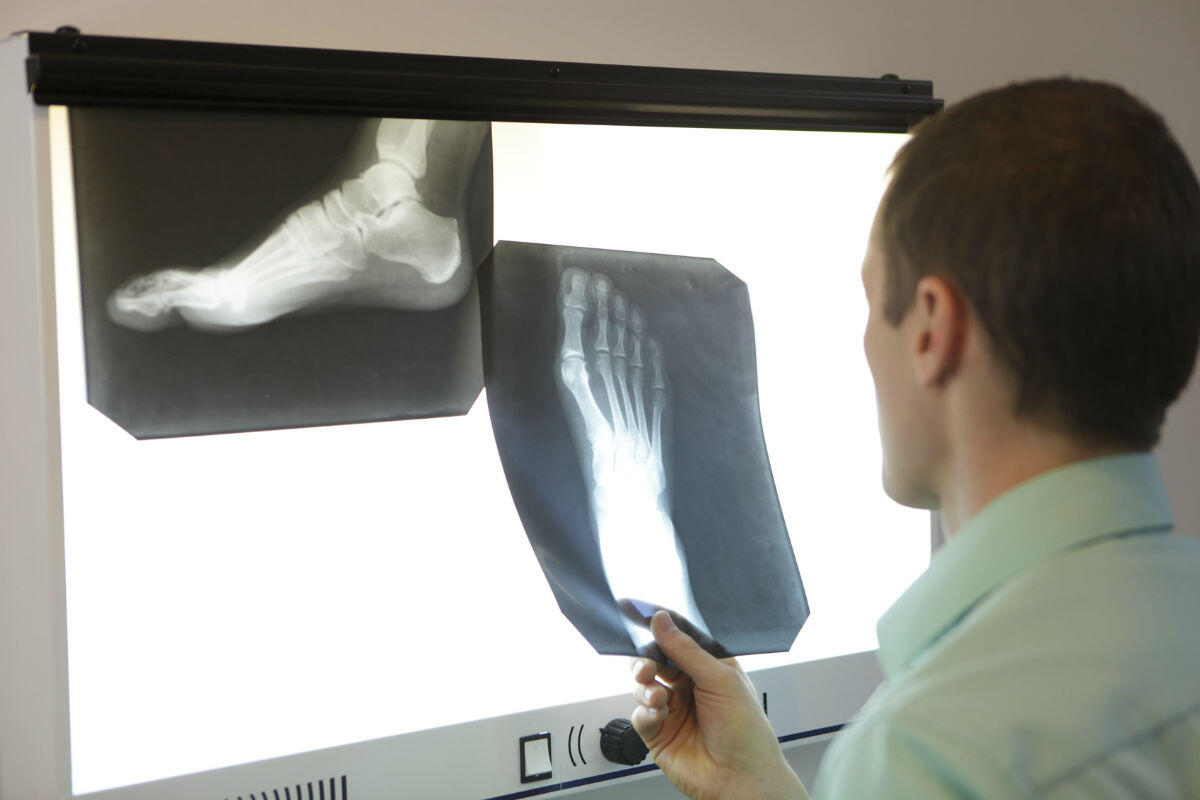If you are finding it difficult to receive your work comp benefits, seek legal help from a Missouri injured at work lawyer.

A work-related heel bone fracture, known as a calcaneus fracture, can be extremely serious and may result in disability. (For more information about permanent disability – Proving the Extent of Your Disability for a Work Injury) In some cases, it is accompanied by other serious injuries such as hip and spine fractures.
Symptoms of a Calcaneus Fracture
A calcaneus fracture is often caused by a high impact collision such as in a motor vehicle accident or a fall from an elevated surface. For example, a construction worker may lose balance on an elevated platform and land on his or her feet. Symptoms of a calcaneus fracture include:
- pain
- swelling
- bruising
- inability to put weight on heel
- deformed heel
- inability to walk
Treatment of Calcaneus Fracture
A calcaneus fracture can be minor, moderate, or severe depending on the extent of force placed on the heel. A stable fracture is the least serious and may heal just by immobilizing the heel with a brace. A displaced fracture is more serious and occurs when the broken ends of the bones do not line up. This type of fracture may require surgery to put the broken ends together, involving the use of metal plates and screws to hold the pieces together to help the healing process.
A compound or open fracture is a serious type of injury in which the bone penetrates the skin. The open wound creates an increased risk for infection and often involves injuries to soft tissues such as muscles, ligaments, and tendons. Compound fractures require immediate surgery and take a long time to heal. Even if the bone does not penetrate the skin but there is injury to the soft tissues, surgery may still be required.
Comminuted Fractures
The most serious type of fracture is a comminuted fracture when the bone is broken into three or more pieces. Comminuted fractures require complicated surgery. Regardless of the type of fracture, the patient must stay off his or her foot for a long period of time ranging from a few weeks to a couple of months. In some cases, there could be permanent loss of function.
Physical therapy is used to restore range of motion and function to the heel. Some patients continue to experience ongoing problems such as chronic pain and joint stiffness even after the fracture has healed. Depending on the severity of the injury, some people are left to walk with an altered gait.
Workers’ Compensation for Calcaneus Fractures
Calcaneus fractures are a serious type of work injury and may cause immense pain to an injured worker. The worker may be unable to work for a long time, especially if he or she has to undergo surgery. The medical costs and a part of lost wages are covered by workers’ compensation. However, if you are finding it difficult to receive your work comp benefits, seek legal help from a St. Louis work injury lawyer. Call The Law Office of James M. Hoffmann at (314) 361-4300 for a free consultation.
Work Related Injuries
Work Related ACL Injury
Leg Amputation
Finger Amputation
Ankle Injury
Ankle Replacement
Arthroscopic Surgery
Work Related Arthritis
Accidental Asphyxiation
Work Related Asthma
Avulsion Injury
Back Injury at Work
Back Pain from Work
Lower Back Pain at Work
Chronic Back Pain
Head Injury Internal Bleeding
Internal Bleeding after Injury
Blood Related Illness
Broken Bones
Brain Injuries
Traumatic Brain Injury
Bursitis Work Related
Burn Injury at Work
Electric Burn
Chemical Burn
Calcaneus Fracture
Sudden Cardiac Arrest
Cardiovascular Disease
Carpal Tunnel Work Related
Cartilage Injury
Cervical Disc Replacement
Cervical Fusion
Chronic Illness
Work Related Chronic Pain
Work Related Concussion
Contagious Disease
Work Related COPD
Skin Corrosion
CRPS Disease
Crush Injuries
Cubital Tunnel Syndrome
Work Related Death
Degenerative Bone Disease
Degenerative Disc Disease Work Related
Reflex Sympathetic Dystrophy
Work Related Tennis Elbow
Elbow Injury
Epicondylitis at Work
Work Related Eye Injury
Fibromyalgia
Work Related Foot Injuries
Work Related Injuries to the Hand
Hand Arm Vibration Syndrome
Work Related Head Injury
Closed Head Injury
Open Head Injury
Work Related Hearing Loss
Heart Attack Work Related
Stroke at Work
Heat Stroke at Work
Intracerebral Hemorrhage
Hernia Work Related Injury
Work Related Herniated Disc
Hip Fracture
Hip Replacement
Hip Injuries
Intracranial Injury
Broken Jaw
Work Related Knee Injuries
Knee Fracture
Laceration
LCL Injury
Legionnaires Disease
Ligament Tear
Limb Loss
Lumbar Disc Replacement
Lumbar Fusion
Lumbar Spinal Fusion
MCL Tear
MCL Injury
Meniscus Tear
Work Related Mental Illness
Mesothelioma from Work
Work Related Muscle Problems
Work Related Neck Pain
Work Related Neck Injury
Nerve Damage from Work Related Injury
Neurological Disorders
Occupational Disease
Organ Damage
Pain and Suffering from Work Related Injury
Paralysis
Patella Fracture
Pelvic Fracture
Plantar Fascitis
Pre Existing Work Related Injury
Work Related PTSD
Radiation Sickness
Repetitive Stress Injury
Rhabdomyolysis
Rotator Cuff Tear
Rotator Cuff Surgery
Work Related Rotator Cuff Injury
Sciatica Work Related
Shift Work Disorder
Shoulder Fusion
Shoulder Impingement
Shoulder Injury
Work Related Shoulder Pain
Sick Building Syndrome
Skull Fracture
Spinal Cord Injury at Work
Spondylolysis
Sprain at Work
Work Related Repetitive Strain Injury
Work Related Stress
Stress Fracture
Subdural Hematoma
Work Related Tendonitis
Lost Tooth at Work
Trigger Finger Work Related
Vertebroplasty
Vision Impairment
Lost Vision at Work
Work Related Wrist Injuries
